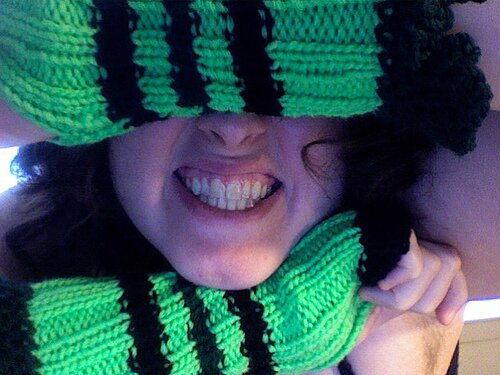Instead of actually panicking, I went in to discover my mother and grandmother already occupying the otherwise empty competition room, showed my mother how to use the video camera I’d brought, and spent a few minutes singing my aria to get a feel for the sound. It was fine; once I had sung, I felt pretty much fine again. People started filtering in, so I went outside to talk to my Dad and distract myself for awhile.
I came back just about twenty-five minutes before starting time, and dropped my stuff off near my family so that I could check my makeup in the restroom. In the restroom, I reapplied some makeup, turned to make sure my dress was all where it was supposed to be, and as I took off my shawl to decide whether to wear it while singing…
…I discovered…
…that I seemed to be…
My mouth fell open.
I looked like I’d been crawling around in a chimney. Everywhere the shawl had covered, I was sooty—and not in a way that was wiping off, like fabric threads.
The shawl had dyed my skin.
I put the shawl back on.
I left the restroom.
To my mother I said, “Emergency. Come with me.”
And she did.
For the next seven minutes, I cackled with freakish calm as we scrubbed my shoulders and arms with restroom paper towels soaked in water and soap. Maybe it was a cheap shawl. Maybe it had never been washed. Who even knows. But I was definitely dyed, and the dye was vaguely purple. We scrubbed and it came off in bits, the way heavy dirt can be rubbed out of skin. I couldn’t believe it. I was actually supposed to be in there fifteen minutes early to draw straws—but I was in here, scrubbing dye out of my skin.
I continued to laugh it off and didn’t seem to really be worried. Grace under pressure, I suppose, but what a bizarre thing to discover just before the competition. I was lucky that we mostly got it off, and I opted to abandon the shawl for the rest of… EVER. Holding it on would get annoying, anyway. I stopped to ask my father if he could see any dirt / soot / purple on me on my way into the room, and he said he couldn’t—so I forgot about it and scooted over to where the other competitors were waiting.
PURPLE doesn’t even match my DRESS.
We drew straws—actually folded pieces of paper in a cup. I was second. And let me tell you a little something about what goes on in my head when I get involved in something like this…
There was one singer there who I felt I was particularly competing with—and she was fantastic. (Her name is Sabrina Coleman Clark, and you should hire her. She’s incredibly good at what she does!) I had caught the tail-end of her rehearsal Friday morning, and I already knew she was a very exciting performer. I’d been looking forward to hearing more from her for the last twenty-four hours, regardless of what that meant for the contest results. (It’s always fun to compete with people I’d gladly see win instead of me—and this was no different. It’s a little bit thrilling! And of course, it presents a particular sort of challenge, which I love.)
Sabrina drew “straw” number four. And all I could think was, Whew—at least we’re not singing back-to-back! Teeny bit harder to directly compare our performances that way! Har, har. Megan M., Voice Competition Strategist.
I sat down, and listened to the first competitor. Then my name was announced. I stood up.
And I went up on the platform to sing.
Everything went reasonably well; I didn’t feel 100%, but I didn’t make any of the mistakes I’d been training myself out of for the past few days. In fact, for the most part, I felt good—it felt good to be up there in front of people, good to inject some emotion, good to see smiles on people’s faces or see them swaying or pressing their hands to their hearts. I had no idea how well I was doing, in my diction, but I knew that the sound felt very good. Not perfect— not the flawless technique I’ll always want—but very good. Enjoyable. Natural.
I finished singing, thanked the audience, gestured to Alan for well-deserved accompaniment kudos, and went back to my seat.
There is so much in here, it’s hard for me to get it all in—to even figure out how to write it all down. There was a lot of certainty on my part that Sabrina had it—and although I did feel a tiny twinge of disappointment I think that’s really what I expected, that she would win first place. Her presentation was truly polished, and she certainly has a comfortable stage presence where I, after two years of focusing almost exclusively on non-musical projects and making a living on my own terms, am most definitely a bit rusty. She clearly does this often (and should). Gwyndaf Jones—the wonderful Welsh tenor who adjudicated on the singing—said as much in his notes. And so my certainty wasn’t so off the mark.
There was one thing I couldn’t identify, however, and that was the diction. I knew that I had mostly achieved the Welsh diction I’d been working on, and I was much more sure of this after the other adjudicator (who had been focusing entirely on Welsh diction) gave us her notes and told me how excellent my Welsh was (twice) despite there being one word that needed a bit of work. That made me feel good, but didn’t tell me how good it had all been. The adjudication notes for Sabrina didn’t tell me much I didn’t already know, either—except that her singing and presentation had been fantastic. And we knew that!
It was clearly a difficult choice for the judges, and I wouldn’t have wanted to be in their place. Gwyndaf paused after their notes for a moment, went back to the judges’ table, then returned to the microphone.



